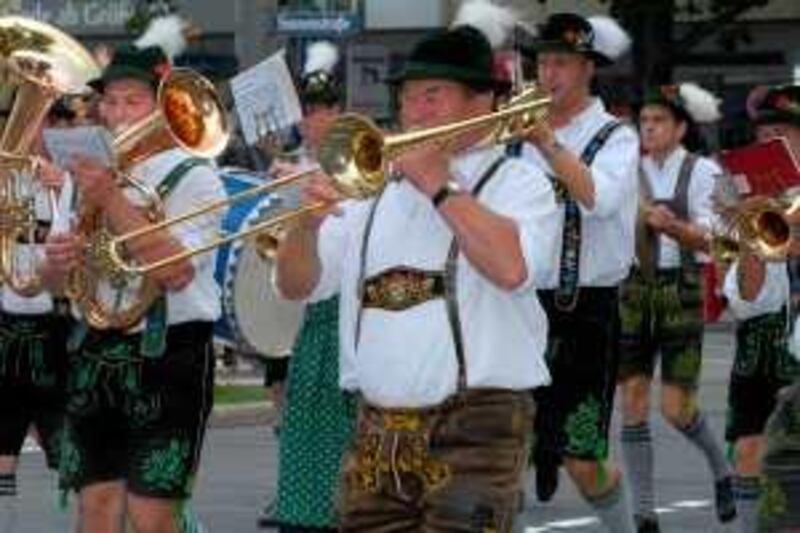BERLIN // Germans own a total of 25 million garden gnomes, are more afraid of inflation than anything else, travel more than any other nationality and produce the biggest quantity and range of sausages in the world, according to a new book of statistics aimed at defining the Teutonic character. One-third of German men regard washing their cars as more important than their own personal hygiene and the country leads the world in rabbit breeding, with 185,000 breeders.
Germany boasts 1,284 breweries, half of which are located in Bavaria, and its annual beer consumption of 123.9 litres per person over 15 is second only to the Czech Republic, according to the eclectic array of figures and surveys compiled in We - Everything One Should Know About Germans. Antje Steinhäuser, 44, one of the three authors, admits that her entertaining compendium provides hard evidence to support some major clichés about Germans such as their love of cars, beer, sausages and order.
"The book confirms a yearning for coziness, a petit-bourgeois attitude, a focus on reliability and a need for rules," Mrs Steinhäuser said in an interview. "And while there are some very funny people here, I wouldn't say humour is the prime characteristic of the Germans. "But we have a curiosity and a spirit of research that has gone into inventing many things. The whole world uses machines developed here."
Statistically, the average German man is called Thomas Müller, has dark blond hair and drives an Audi A4. The penchant for globe-trotting has a simple explanation. "Reliability, punctuality, the need for orderliness that leads to rampant bureaucracy - it has its useful aspects, but it explains why so many of us yearn to escape to the sun," Mrs Steinhäuser said. The fear of price rises is explained by the hyperinflation that plagued Germany in the aftermath of the First World War. The memory remains etched into the national psyche.
Aside from confirming preconceptions, the book contains some surprising titbits, though. The British may be shocked to learn that the tea bag was invented by a German, Adolf Rambold, in 1929. And Hitler's foreign minister, Joachim von Ribbentrop, was a member of the Canadian national ice hockey team in 1914. The extensive gnome population stems in part from the country's love of fairy-tales and its mystical relationship with dense forests. Ever since they became fashionable in the 19th century, the grinning bearded figures carrying lanterns, wheelbarrows or fishing rods have been a firm fixture in German gardens.
They epitomise a narrow-minded, comfort-orientated and apolitical vein of the middle class. "There is no denying that we're a nation of gnome lovers. It is part of our mentality and this parochialism still exists," Mrs Steinhäuser said. "The garden gnome stands for coziness but also for a desire to segregate oneself and mark one's territory in this densely populated country. Psychologically, the gnome is like a little sentry."
However, many Germans have a tongue-in-cheek attitude towards gnomes these days. There is a growing tendency to install gnomes that make obscene gestures, and courts have ordered figures to be removed if they offend neighbours. The passage of time and the passing of the wartime generation have made Germans less inhibited about exploring their own national character. The book is part of a new trend that until recently would have been frowned upon in the country that committed the Holocaust.
Books published since 2006 include We Germans - Why Others Can Like Us and The Best About Germany - 250 Reasons to Love Our Country. "Germans feel increasingly free to think about what it means to be German without being seen as too nationalistic or too in love with themselves, and without other nations having to be alarmed," Mrs Steinhäuser said. "We have spent a lot of time coming to terms with the historical burden our ancestors left us."
She said her compatriots' behaviour on holiday gave some interesting insights into their need to mark their territory. For example, sunbathers on the beaches of northern Germany tend to build sand walls around themselves and often decorate them with shells. And the tendency to reserve the best spots around the hotel resort pool by putting towels on the lounge chairs at 5.30am is of course legendary. "I cannot deny that this embarrassing habit exists," Mrs Steinhäuser said.
The book also lists some of the plethora of petty laws that govern every aspect of life here. Dogs are permitted to bark no longer than 30 minutes a day in residential areas. And there is a law that says it is permitted to tread on a lawn to erect a sign forbidding people to step on the lawn. The book also contains a list of such German inventions as the car, the computer, the television, toothpaste and airbags.
A love of language is a further national trait. Germans pride themselves on having the only language in the world that can construct new words by adjoining an indefinite number of other words, thereby permitting them to describe the world with Teutonic precision. Schadenfreude, for example, succinctly conveys the pleasure one derives from the misfortune of others. "Many people say 'trust the nasty Germans to come up with that word'," Mrs Steinhäuser said. "But we invented it because our language allowed us to."
The predilection for sausage is also reflected in German idioms. "Don't be an insulted liver sausage," for example, means "Don't be over-sensitive". And "It's all about the sausage" means "It's all or nothing". foreign.desk@thenational.ae






